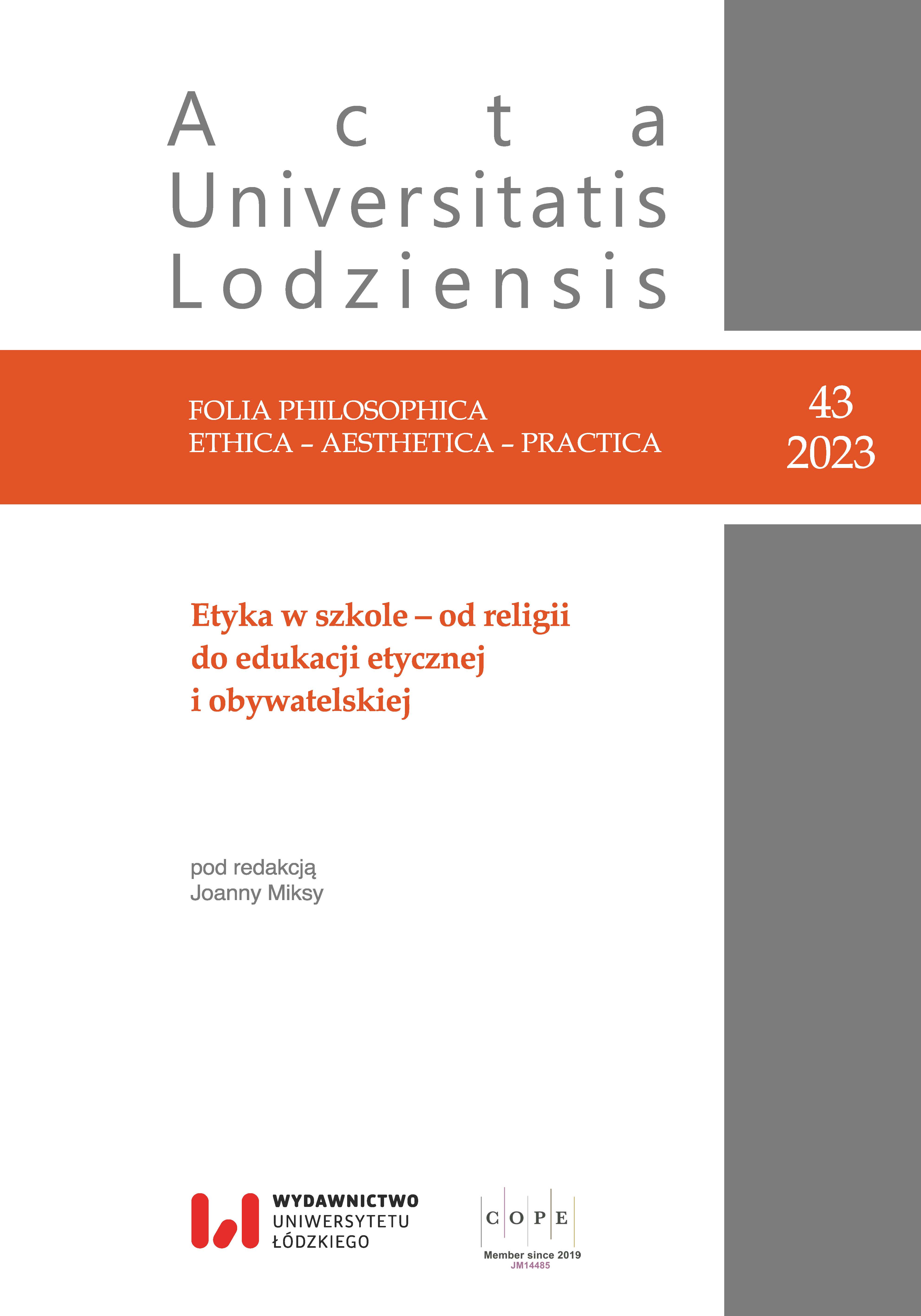Metody nauczania w edukacji etycznej w Holandii
DOI:
https://doi.org/10.18778/0208-6107.43.05Słowa kluczowe:
nauczanie etyki w Holandii, technika scaffolding, metody nauczania etyki, efektywność uprawiania filozofiiAbstrakt
Artykuł przybliża umiejscowienie etyki w programach edukacji szkolnej w Holandii oraz cele i praktyki jej nauczania. Omawia wyniki badań przeprowadzonych w szkołach holenderskich, mających na celu sprawdzenie jakie metody dydaktyczne najlepiej służą rozwijaniu wiedzy i kompetencji uczniów. Jaki model interakcji w pracy uczniów z nauczycielem jest najkorzystniejszy? W badaniu wykorzystane zostały formy nauczania oparte na technice scaffolding (rusztowania). Opiera się ona na wspólnym rozwijaniu problemów i dyskusji filozoficznej, poprzez porządkowanie pytań, szukanie alternatywnych odpowiedzi oraz zróżnicowanych przykładów. Obserwacje z badań potwierdzają dobrą skuteczność tej metody, zwłaszcza gdy proces rozumowania jest jasno uporządkowany, konstrukcja pytań źle sformułowanych jest korygowana i pojawiają się metakoncepcje. Porównawcza analiza wybranych lekcji pozwala stwierdzić, że wybór formy nauczania decydująco wpływa na poziom zaangażowania uczniów i w konsekwencji na rozwój ich kompetencji; istotny jest też aktywny udział nauczyciela jako koordynatora dyskusji, uruchamiającego dialog i nadającego mu czytelną logicznie strukturę. Z tego względu istotne jest, by nauczyciele prowadzący zajęcia mieli odpowiednie kompetencje filozoficzne i metodyczne.
Bibliografia
Alberts, R. V. J. i Erens, B. J. M. (2015). Verslag van de examencampagne 2015 voortgezet onderwijs. Online: https://cito.nl/media/3wgffiyp/cito_verslag_examencampagne_2015.pdf [dostęp: 23.12.2023].
Google Scholar
Aulls, M. W. (2002). The contributions of co-occuring forms of classroom discourse and academic activities to curriculum events and instruction. Journal of Educational Psychology, 94, s. 520–538.
Google Scholar
DOI: https://doi.org/10.1037//0022-0663.94.3.520
Carr, D. (2003). Making Sense of Education: An Introduction to the Philosophy and Theory of Education and Teaching. London: Routledge.
Google Scholar
Cerbin, W. i Kopp, B. (2006). Lesson Study as a Model for Building Pedagogical Knowledge and Improving Teaching. International Journal of Teaching and Learning in Higher Education, 18 (3), s. 250–257.
Google Scholar
Chin, C. (2006). Classroom Interaction in Science: Teacher Questioning and Feedback to Student’s Responses. International Journal of Science Education, 28 (11), s. 1315–1346.
Google Scholar
DOI: https://doi.org/10.1080/09500690600621100
Ebbens, S., Ettekoven, S. i Van Rooijen, J. (1996). Effectief leren in de les. Basisvaardigheden voor docenten. Groningen: Wolters-Noordhoff.
Google Scholar
Goucha, M. (2007). Philosophy, a School of Freedom: Teaching Philosophy and Learning to Philosophize; Status and Prospects. UNESCO Digital Library. Online: https://unesdoc.unesco.org/ark:/48223/pf0000154173 [dostęp: 24.12.2023].
Google Scholar
Havekes, H. G. F., Coppen, P. A. J. M., Luttenberg, J. M. i Van Boxtel, C. A. M. (2012). Knowing and doing history: A conceptual framework and pedagogy for teaching historical contextualisation. International Journal of Historical Learning, Teaching and Research, 11 (1), s. 72–93.
Google Scholar
DOI: https://doi.org/10.18546/HERJ.11.1.06
Kessels, J. (1989). Kennis van kennis. Een ontwikkelingsonderzoek in didactiek van filosofie. Utrecht: Innovatiefonds van de Rijksuniversiteit.
Google Scholar
Kessels, J. (2009). Philosophy for Children as Educational Reform. W: Marsal, E., Dobashi, T., i Weber, B. (red.), Children Philosophize Worldwide. Theoretical and Practical Concepts. New York: Peter Lang, s. 117–126.
Google Scholar
Kienstra, N. (2016a). Doing Philosophy is Learning a Language (The Pearl Model). Europa Forum Philosophie, 2016, s. 115–125.
Google Scholar
Kienstra, N. (2016c). Effectief filosoferen in de klas: Docenten zelf lesontwerpen laten maken in het schoolvak filosofie (Proefschrift Radboud Universiteit). Enschede: Ipskamp.
Google Scholar
Kienstra, N. i Van der Heijden, P. G. M. (2015). Using correspondence analysis in multiple case studies. Bulletin de Methodologie Sociologique (Bulletin of Sociological Methodology), 128, s. 5–22.
Google Scholar
DOI: https://doi.org/10.1177/0759106315596920
Kienstra, N., Imants, J., Karskens, M. i Van der Heijden, P. G. M. (2016b). Doing philosophy effectively: Student learning in classroom teaching. Online: https://www.ncbi.nlm.nih.gov/pmc/articles/PMC4574705/ [dostęp: 10.02.2016].
Google Scholar
DOI: https://doi.org/10.1371/journal.pone.0137590
Kienstra, N., Karskens, M. i Imants, J. (2014). Three approaches to doing philosophy: A proposal for grouping philosophical exercises in classroom teaching. Metaphilosophy, 45 (2), s. 288–319.
Google Scholar
DOI: https://doi.org/10.1111/meta.12085
Kienstra, N., van Dijk-Groeneboer, M. i Boelens, O. (2018). Religious-Thinking-Through Using Bibliodrama: An Empirical Study of Student Learning in Classroom Teaching. Religious Education, 113 (2), s. 203–215.
Google Scholar
DOI: https://doi.org/10.1080/00344087.2017.1403788
Kirschner, P. A., Sweller, J. i Clark, R. E. (2006). Why minimal guidance during instruction does not work: An analysis of the failure of constructivist, discovery, problem-based, experiential, and inquiry-based teaching. Educational Psychologist, 41 (2), s. 75–86.
Google Scholar
DOI: https://doi.org/10.1207/s15326985ep4102_1
Korthagen, F. A. J. (1985). Reflective teaching and preservice teacher education in the Netherlands. Journal of Teacher Education, 9 (3), s. 317–326.
Google Scholar
DOI: https://doi.org/10.1016/0742-051X(93)90046-J
Marsman, P. (2010). Vakdossier Filosofie. Enschede: SLO.
Google Scholar
Meester, F., Meester, M. i Kienstra, N. (2014). Durf te denken! Werkboek havo 4: Wetenschapsfilosofie. Amsterdam: Uitgeverij Boom.
Google Scholar
Oosthoek, D. H. (2007). Balans van 35 jaar filosofie in het voortgezet onderwijs in Nederland. Tijdschrift voor Filosofie, 69, s. 783–809.
Google Scholar
Thijs, A. i Van den Akker, J. (2009). Leerplan in ontwikkeling. Enschede: SLO.
Google Scholar
Van den Akker, J. (2003). Curriculum Perspectives. An Introduction. W: Van den Akker, J., Kuiper, W. i Hameyer, U. (red.), Curriculum Landscapes and Trends. Dordrecht: Springer, s. 1–11.
Google Scholar
DOI: https://doi.org/10.1007/978-94-017-1205-7
Van der Kooij, J. C., De Ruyter, D. J. i Miedema, S. (2013). "Worldview": the Meaning of the Concept and the Impact on Religious Education. The Official Journal of the Religious Education Association, 108, s. 210–228.
Google Scholar
DOI: https://doi.org/10.1080/00344087.2013.767685
Van der Leeuw, K. i Mostert, P. (1991). Filosofie-opvatting en onderwijsstijl. VIC Tijdschrift voor Filosofieonderwijs, 20 (1), s. 15–24.
Google Scholar
Van de Pol, J., Volman, M. i Beishuizen, J. (2010). Scaffolding in teacher–student interaction: A decade of research. Educational Psychology Review, 22, s. 271–296.
Google Scholar
DOI: https://doi.org/10.1007/s10648-010-9127-6
Pobrania
Opublikowane
Jak cytować
Numer
Dział
Licencja

Utwór dostępny jest na licencji Creative Commons Uznanie autorstwa – Użycie niekomercyjne – Bez utworów zależnych 4.0 Międzynarodowe.












